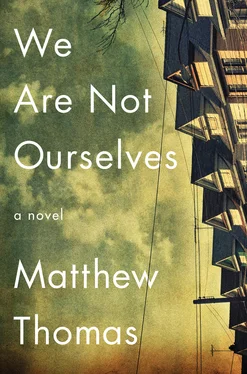He was about two weeks shy of having gathered all the data he needed when the heating plant broke down and the aquaria froze, killing his specimens.
He didn’t smash equipment or hurl insults at the plant manager. He didn’t come home and make life miserable for her. He ate a quiet dinner and lay on the floor in the living room, between the glass-topped coffee table and one of the couches. She lay on the other couch reading to keep him company. She understood he didn’t want a pep talk. When it was time to turn in, she leaned over him and saw in his eyes not sadness but extreme fatigue. She knew enough not to tell him everything would be fine. She gave him a kiss on the lips, told him to come in soon, and shut the light off. He remained behind in the silent dark. He came to bed very late, and the next day he began again from the beginning, with new fish, because he needed a full set of data.
When he finished a year later, he had worked on the fish for so long that the species’ scientific name had changed twice, from Tilapia heudelotii macrocephala to Tilapia melanotheron to Sarotherodon melanotheron melanotheron .
“You never get anywhere worthwhile taking shortcuts,” he said when she asked how he’d gotten through that difficult time. She couldn’t have agreed more. Not taking shortcuts — not settling for someone inferior — was the only reason she’d been free to marry him.
• • •
They started going out again. Ed got them a membership at the Metropolitan Symphony Orchestra. Once, when they were heading to the symphony, he picked a wounded fledgling off the sidewalk and carried it in his handkerchief for a few blocks, until he bowed to her protestations and deposited it in a planter. He gave her the silent treatment until they got home. When she was shutting off the light she said, “Good night, St. Francis of Assisi,” and he laughed despite himself and they made love and fell asleep.
• • •
In December of 1970 she headed to the city with Ed to see the window displays on Fifth Avenue. She was excited to see them, despite how corrosively ironic Ed had been about them the year before, when at one point in his jeremiad he’d called them “altars to consumer excess.” She wasn’t about to let his grousing spoil her enjoyment of a tradition she’d observed whenever she could since she’d first gone with her mother as an eleven-year-old.
Ed refused to pay for a parking garage. It took them half an hour to find a spot, and they ended up on Twenty-Fifth and Seventh, almost a mile from Lord & Taylor. He refused to let them take a cab, even though she was wearing heels and it was twenty degrees out, with a wind that whipped up the avenue. The sun was setting, and store gates were being pulled down as if in protest of the cold. The sidewalks of Seventh Avenue were unusually empty. She noticed that most of the cabs that passed were occupied.
As they neared the store, the sidewalks grew more crowded, the bells of the Salvation Army collectors jingling on each corner. They saw a pack gathered in front, which quickened her step and made Ed sigh and slow down.
She had been delighting in the scene of a golden retriever pulling at the corner of a wrapped gift when Ed — who had been munching his way toward the bottom of a little bag of roasted nuts — broke the spell.
“These things seem here for the purpose of entertainment,” he said, “but really they’re here to get you to come in and part with your money.” He spoke in a breezy, careless way that suggested he believed a new understanding had sprung up between them. “They’re like organisms that have evolved elaborate decorative mechanisms to lure you in. People fall for it. It’s fascinating, actually.”
“Listen to yourself.”
“The bee orchid, for instance, has flowers that look like female wasps. Males try to mate with it, and in the process they get pollen on their feet and spread it around. It’s not about the window. It’s about pulling you into the store. It’s about getting you to leave with something.”
She was attempting to concentrate on the little animatronic girl whose hand was traveling slowly to cover her mouth, which had fallen open at the sight of Santa Claus’s ebony boots disappearing up the chimney.
“It’s a stupefying, hypnotic loop. It puts you in a suggestible state.”
“Do you have to be so heady about everything? Do you have to analyze everything to death?”
“What’s amazing is that they’re exactly the same every year.”
“That’s an ignorant remark,” she spat. “They’re not the same at all. They put a lot of work into these. Months of planning.”
She wouldn’t have minded his objections so much if he hadn’t insisted on drawing her into a dialogue about them. Was it too much to ask to share a moment of joy?
She looked around at the other husbands. They didn’t look any happier to be there, but they stood back dully, hands folded behind them or scratching their noses. They couldn’t have been as cleverly cruel about it as Ed if they’d tried.
“And the battling of tourists,” he said. “Every year it gets worse. The jostling, the jockeying for position. They’re descending on the imperial city for their bread and circuses. I wish we didn’t have to do this.”
She started walking to the train. A couple passing in the other direction gave her curious looks, as though they could see the intensity of her disgust in her expression. She found herself unaccountably smiling at one man, giving him a manic sort of grin full of the slightly breathless ecstasy of being unmoored, and he returned it with a delighted blush. By the time she felt a tug on her elbow, she was at the next corner.
“Don’t be hysterical,” Ed said. “I was just making a few observations.”
“The world isn’t a lab.”
“Come on,” he said. “Let’s go back and look.”
In his worn jacket with the frayed sleeve ends, he looked like a war veteran about to ask for change for the subway.
“You’ve ruined it.”
“Don’t say that. Listen, I can’t help myself sometimes. I don’t know what’s wrong with me.”
“I do,” she said. “You didn’t have enough fun as a kid.”
He pulled her arm, but she wouldn’t budge. She watched steam rise from a manhole cover and felt in her chest the rumbling of a passing bus. She was keenly aware of the limits of the physical world. She wanted to be in one of those scenes in the windows, frozen in time, in the faultless harmony of parts working in concert, fulfilling the plan of a guiding, designing hand. It would be lovely not to have to make every decision in life, to be part of a spectacle brought out once a year, for the safest of seasons, and put to work amusing people who stared back in mute appreciation. The real world was so messy, the light imperfect, the paint chipped, the happiness only partial.
“One of these years,” she said, “we will come here and you will enjoy it and not make me feel miserable about it. I dream of that.”
“Let’s let that be this year,” he said. “Let’s go back and look at those windows. Please, honey. Let me make it up to you.”
“It’s too late,” she said.
“It’s never too late,” he said. “Don’t say that.”
She hadn’t been looking at him; now she stopped to. Streams of people flowed past in either direction, rushing toward obscure destinations. This was her life right here, petty as it seemed at the moment, and this was the man she’d chosen to spend it with. He was holding his hat in his hand as if he’d taken it off for the purpose of beseeching her, and she saw that he would always have flaws, that he would always be a little too intense in his objections, a little too unbending when it came to the decadence of the world. She thought, We can’t all wear a hair shirt all the time . But there he was, trying to pull her back to the scene he despised, and she saw that he couldn’t live in a way other than the one he thought was right, and when he saw what the right thing was, like now, he cared about it as if it were the only thing that mattered. Everyone else around seemed as insubstantial as the air they moved through, the shopping bags they carried the only things anchoring them to the ground.
Читать дальше
Конец ознакомительного отрывка
Купить книгу












